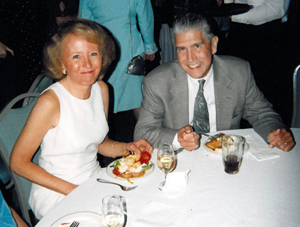 |
Fred Monnich and his wife, Lincoln radio news reporter Jane Monnich. |
Prior to The Lied Transplant Center’s official opening in 1999, he was among the first patients to have pioneered the use of the cooperative care treatment model for his non-Hodgkin’s lymphoma.
With cooperative care, patients designate a caregiver to be with them around the clock and take care of all their needs. The caregiver gives medications to the patient, takes vital signs and looks for any possible adverse reactions.
For Monnich, a senior account manager for NRG Media in Lincoln, his wife, Jane, was the caregiver.
“As one of the first cooperative care patients, I remember they put us in a mock room,” Fred Monnich said. “It reminded us of Jane’s old dorm room.”
Jane, a veteran news reporter for KLIN-AM radio in Lincoln, took an eight-week leave of absence to be with her husband during this most tumultuous time in his life.
The prognosis was not the best. Monnich’s cancer was in an advanced stage.
His physicians — Phil Bierman, M.D., and James Armitage, M.D. — told him that there was only a 3 in 10 chance that the peripheral stem cell transplant would cure his cancer.
“This was obviously quite unsettling,” Monnich said. “I remember Dr. Bierman telling me to not be concerned about the odds. He said, ‘The only thing that counts is you. It doesn’t matter what happened to others before you.'”
Monnich’s cancer first manifested itself in the fall of 1997. He went through a round of chemotherapy and was hopeful that the cancer had been eradicated. It returned the following spring after he came back from a golf trip in Arizona.
“I had a cough,” Monnich said. “I thought it was an early spring allergy. I went to my doctor in Lincoln, and he took a chest X-ray. He called back later that afternoon and wanted Jane and I to come over to his office. He showed us the X-ray. There was a lot of tumor activity in my chest.”
At that point, his physician in Lincoln, Cary Peterson, M.D., referred Monnich to UNMC and its hospital partner, The Nebraska Medical Center. He received his stem cell transplant on Aug. 3, 1998.
|
|
“I think the caring and sincerity of purpose goes a long, long way,” he said. “I remember how Linda Wills (clinical education coordinator) sat down with Jane and educated her on all the procedures she would need to do.
“After I got through the treatment, the big thing that really stuck with me was how close the team followed up with me. They didn’t just say, ‘See ya.’ When I was two years out, I received a greeting card from one of the nurse coordinators saying, ‘If you’re feeling a little lousy today, it’s because you’re going through the terrible twos.'”
With his new immune system, Monnich was in fact starting over again. He needed to get all new vaccinations.
Throughout his nearly two-month stay in the Lied Transplant Center, Monnich’s spirits were lifted by receiving a greeting card nearly every day from his close friend, Randy Nitz, who works in the Office of Technology Development at the University of Nebraska-Lincoln.
“It was an easy thing to do,” Nitz said. “I was just trying to brighten his day. He wasn’t looking at good odds, and Fred’s a pretty positive guy. We came up to visit him at least twice. I remember asking if he and Jane could go out for ride. Fred said, ‘Let’s go.’ I think just being out in the sun was really uplifting for him.”
Nitz said having a medical center close to Lincoln that was able to do peripheral stem cell transplants was really beneficial to everyone. He noted that his mother, Oneta Nitz, also developed lymphoma later on and was successfully treated at the medical center.
After he completed his treatment, Monnich participated in a video designed to acclimate future cancer patients going through cooperative care. Now, as Monnich celebrates his tenth year with his new immune system, the cooperative care model is still going strong.
“It’s a unique care model. No doubt about it,” said Lynn Borstelmann, director of oncology services for The Nebraska Medical Center. “It’s fabulous for patient satisfaction. The Lied Transplant Center is a great environment for patients. They have more space. The rooms are more like a hotel than a hospital room. They have more control. It makes for a very positive experience.”
Over the past 35 years, a total of 3,869 patients have received bone marrow or peripheral stem cell transplants at the medical center.
Survival rates have improved tremendously over the years, Dr. Bierman said. The two-year survival rate in 1983 was less than 30 percent. Today, it is more than 80 percent.
“We’re doing a whole lot better,” Dr. Bierman said. “Many of the advances, such as the use of peripheral stem cell transplants and hematopoietic growth factors, have occurred at our place. That’s very gratifying.”
For Monnich, 63, life is good. He and Jane continue to work. Their three children are now grown and have given them eight grandchildren. They have a wonderful home on the tenth hole of Woodland Hills Golf Course in Eagle, Neb., and they always look forward to spending time throughout the year at their place in Sea Pines Resort on Hilton Head Island in South Carolina.
As the Monnichs go about their busy lives, one thing remains constant — they’ll never forget their time at the medical center. Each year, they remember by sending a poinsettia to Dr. Bierman during the holidays.
A small token of thanks from a very grateful “guinea pig.”